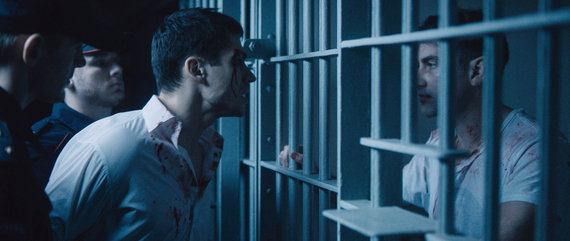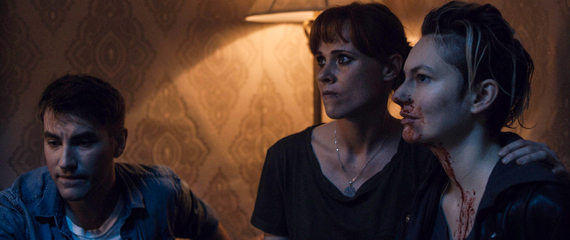By Aaron Weiss
The upcoming narrative feature film Roads to Olympia chronicles the stories of three young athletes in three different countries striving to make it to the Summer Olympic Games. Along the way, they not only face challenges on the field, but the social constructs in their countries also obstruct their path to realizing their dreams. Over the next few weeks, we will take a closer look at each of those social issues and how the film will aim to pull back the curtain and generate awareness for each cause.
One of the film's main characters is Roma, a talented Russian decathlete whose father is a powerful politician in Moscow. Despite all his success and promise, Roma is living a double life. He is a closeted homosexual and has a secret boyfriend named Petr. Roma must keep his true self hidden, for fear of persecution and to avoid damaging his father's reputation. Roma is not alone in this conflict. Because of the Russian government's hostile attitude towards the country's LGBTQ community, and several anti-gay groups rising to the forefront, it is a very dangerous time to be gay in Russia.
Following the fall of the Soviet Union in 1991, Russia actually began to be more liberal in their views towards LGBTQ rights. Homosexual relationships were decriminalized in 1993, and transgender Russians were even able to legally change their gender on identification documents. In recent years, that progress has come undone as the government has implemented new laws banning "non traditional "sexual relations. The government insisted these laws were created to protect minors from pedophiles. Yet just last year, Communist Party lawmakers Ivan Nikitchuck and Nikolat Arefyev helped to pass even stricter bills which outlaw public displays of homosexuality, including practices as harmless as kissing or holding hands. Those who are flagged under this new law would be subject to fines or even jail time.
Roads To Olympia: Daniel Alexander and Alexander Khvashchinsky
These harsh measures from the government have led to violent clashes between police and LGBTQ activists and have paved the way for the rise of several anti-gay organizations such as "Parents of Russia" and "Occupy Pedophilia." As profiled last year in Britain's Channel 4 documentary "Hunted", these groups use the internet to lure gay men and lesbian women into meeting and then employ intimidation and violence to humiliate and injure their targets, while filming the encounters for online consumption. These acts of violence have resulted in death, but police investigations are minimal and the victims' obituaries treat the death as an ordinary homicide.
The Russian government has essentially turned a blind eye towards the victims. In fact, Russian officials openly claim that there is no issue, and that Russia ensures total equal rights to its LGBTQ community. Such statements include Russian president Vladimir Putin's appearance last fall on 60 Minutes where he asserted that there is no anti-gay persecution in Russia and that the government's installation of anti-gay laws has been greatly exaggerated. Putin's claims echo similar comments he made in advance of the Sochi Winter Olympics in 2014. Whether or not Putin acknowledges that there is a problem, violence against the LGBTQ community is on the rise.
Despite the horrible conditions described herein, Russia is far from the only source of peril for the LGBTQ community around the globe. It is worth noting that it is still illegal to be gay in 79 countries, and Russia is not included in that list. Every day, the international LGBTQ community faces terrible hardships in the form of governmental persecution, bullying and intimidation, and even murder. In the last year alone, the horrific acts include LGBTQ students bullied in Japan, the brutal murders of well-known LGBTQ activists in Bangladesh, and the public beheadings by ISIS of gay men in Iraq.
But there is hope on the horizon. With the goal to put an end to the violence and persecution, a number of human rights organizations are speaking out in protest of Russia's anti-gay laws. During the Sochi Olympics, Human Rights Watch, an international non-governmental organization that conducts research and advocacy on human rights, All Out, an organization fighting for global gay rights, and Athlete Ally, a group focused on ending homophobia and transphobia in sports, started the Principle 6 campaign, named after the provision in the Olympic charter that is supposed to guarantee non-discrimination for all Olympic participants. Principle 6 experienced plenty of success during the Sochi Olympics, with All Out delivering a 300,000 name petition to the International Olympic Committee, causing three National Olympic sponsors to publicly denounce Russia's anti-gay laws, and gaining the support of celebrities such as Rihanna, Mark Ruffalo, and Zachary Quinto.
The cast of Roads to Olympia also views this as a chance for the film to help make a difference. Daniel Alexander, who plays Roma, sees the problems going on in Russia as a wide sweeping issue that people all over the world can relate to. "Discrimination is a universal issue that we've faced throughout history by making distinctions between each other," he said, "Roma's story gives me an opportunity to relate to him emotionally. Being able to relate to one another is one of the most beautiful abilities we have as human beings. It is the opposite of making distinctions."
Masha Borovikova, another member of the Roads to Olympia cast, sums up the cast's role in helping to make a positive difference in the greater cause. "We have only helped to tell the story, which is a disturbing one. But if someone watching this film uses it to improve something in their lives, then I will be happy."


